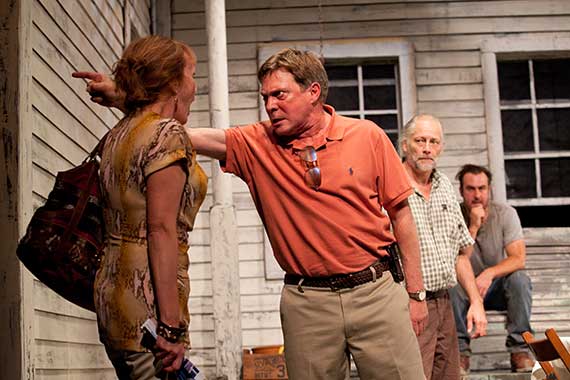Who doesn’t like watching a good screaming match? They’re dramatic, tension-ridden, the stakes are high and it makes for great entertainment.
The same can be said for August, An Afternoon in the Country — Jean Marc Dalpé’s critically acclaimed play about a dysfunctional Canadian family living on a farm outside of Montreal.
Translated from Dalpé’s original French version, Août – un repas à la campagne, by his wife Maureen Labonté, and directed by Harry Standjofski, the play comes to life on the Centaur’s main stage more than six years after it first premiered in Quebec back in 2006.
“Who are these people?” asks Dalpé in the program’s ‘playwright’s notes’ section. “There are many tricks of the trade to tell a story on stage but I tried to stay away from most of them to focus on just that one question.”
With this in mind, the viewer is prepared for what follows — 80 minutes of impeccable acting, a few chuckles (mostly at Grandma, a hilariously bitter and judgmental gem, played by the very talented Clare Coulter), and the rawness that accompanies the disintegration of a seemingly normal, yet loud and abrasive, family.
The set design is stunning and effective, consisting of a white wooden porch, a swing, and a pebble-lined front lawn. To the left and right of the stage lies an imaginary apple tree, hen house, and driveway. There are no frivolities, just the necessary swinging door, allowing actors to go from the porch to the inside of the house. When it’s time for supper, a wooden plank and two-by-fours form a makeshift table, exactly like they would on a hot summer’s day up north.
However, the most impressive part of the setting was the sunny yellow lights and summer sounds, used to create the swelteringly hot atmosphere that is essential to August’s drama and denouement. How else can Josée, the feisty teenage daughter (played by a very confident and promising Arielle Palik), scream about having to move the car and lose her temper about having to go to the dry cleaners if it weren’t for the intolerable heat? How could Monique (an enchanting and funny Danette Mackay), the sophisticated family member who plays golf with her new husband and lives in the city, fan herself constantly if it weren’t for the humid summer air? In other words, the set and costume design for a play such as this requires a fabulous magician. James Lavoie deserves all the praise he has received thus far, and being a five-time recipient of the Montreal English Critics Circle Award, his skill comes as no surprise.
The only downside to August is the ending. It is a running gag in theatre to say that “if you don’t like the ending, then you don’t like the play.” Sadly, in this case, ‘I didn’t like the play.’
The entire length of the play, the tension rises and rises and rises, as the audience sits through an emotionally draining but realistic break down. There is so much screaming, and cringe-worthy heartbreak that you expect a great pay-off the end, you want something (anything, even if it’s bad) to come from all of this difficulty and despair!
Instead, the situation is left opened-ended and somewhat unresolved — the main characters all standing stock-still on the stage as the lights dim. The audience does have the opportunity to experience the trials and tribulations of this family. They learn that even in the country, where we sometimes believe life to be beautiful and carefree, there is real life and real problems. Yet, it seems, that we only have one afternoon… and perhaps one afternoon is simply not enough.
August, An Afternoon in the Country runs until Oct. 28. For ticket and showtime information visit centaurtheatre.com
